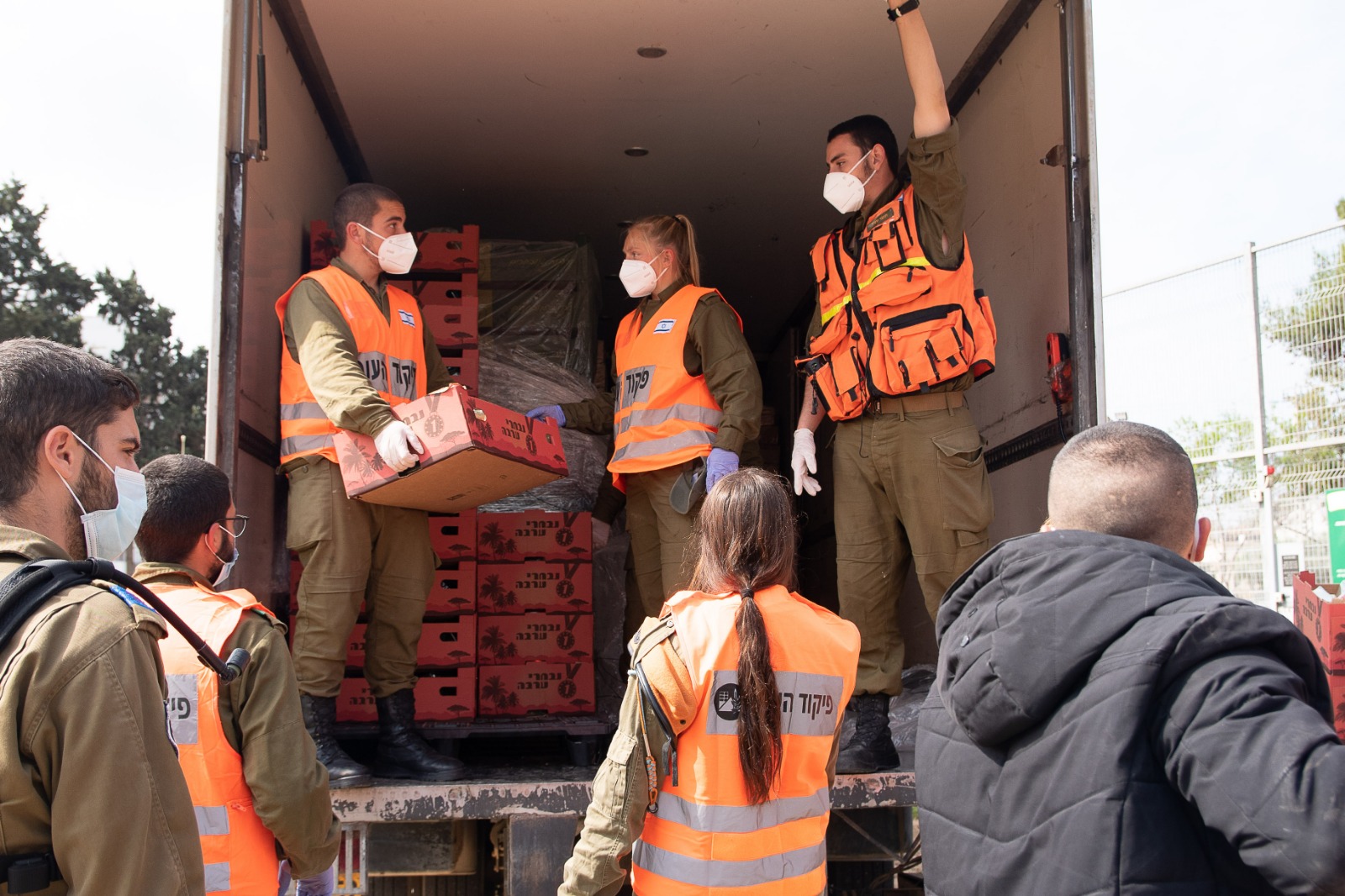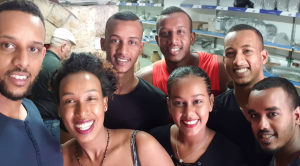Reduced Inequalities


Home » Reduced Inequalities » SDG 10- Social Safety Net against Corona
SDG 10- Social Safety Net against Corona
Social Impact Under Corona – Part One
Read: Part Two, Part Three, Part Four, Part Five, Part Six
Israel’s commitment to social impact remains front and center as the number of those affected by the global corona pandemic mounts. This effort weaves through grassroots initiatives, established civil society organizations, government and the private sector.
This dedication to alleviating the suffering of its particularly vulnerable populations is recognized as a necessary accompaniment to the over-arching goal of saving lives. The reality of shutdown, social distancing, self-quarantine and other measures enacted to stem corona’s spread are difficult in and of themselves; life in such conditions can border on the unbearable for senior citizens, people with disabilities, families living near the poverty line and other challenged communities.
The country’s recognition of social impact’s importance during the corona crisis starts at the very top. In a public expression of this, President Rivlin made it a point of meeting with the Labor and Social Affairs Minister at an early stage of the crisis. The meeting included a discussion of the risk of increased domestic violence as the public is required to stay at home for prolonged periods of time.
“Social Safety Net”
The strongest example of government social impact activity during corona comes through in Israel’s recently announced economic assistance package, which contains a self-described “social safety net” totaling NIS 20 billion. This includes stipends for those who lost income; NIS 40 billion earmarked to assist businesses with tax breaks, loans and other services; about NIS 10 billion for the healthcare system; and nearly NIS 8 billion to speed up the recovery.
Recognizing the country’s symbiotic inter-sectoral relationship in promoting social impact, the assistance package contains specific provisions to help keep civil society afloat. These include a NIS 200 million fund, in partnership with philanthropy, to help government-supported NGOs continue their activities and maintain their organizational infrastructure. In addition, a government-backed loan fund has been made available to social welfare NGOs with turnover of at least NIS 4 million in the fields of health, education and welfare.
Another notable aspect of this “social safety net” includes a NIS 200 million expansion of employment training programs to help those who have lost their jobs as a result of the crisis to quickly regain quality employment. A special NIS 4,000 grant to those aged 67 and over whose employment has been terminated has also been decided upon.


Senior Citizens
While attention to the needs of vulnerable populations has been wide, particular focus has been directed toward Israel’s elderly population. The plight of the country’s senior citizens during corona is among the most prominent issues in the public discourse, featured regularly in media reports as well as commercials and public service announcements.
The first Israeli to die from complications stemming from corona virus was an 88-year-old Holocaust survivor, a tragedy that reverberated throughout the country. The call for social impact measures to assist them has been powerful, and the authorities have acted in a variety of ways.
Since mid-March, more than a million hot meals have been distributed to over 120,000 senior citizens by the Labor and Social Affairs Ministry with the assistance of the Israel Defense Forces, local authorities and volunteers. (More broadly, the IDF has joined forces with the country’s civil society to ensure access to essential food, medicine, hygiene products and other basic necessities.)
Young Israelis performing their national service in Social Equality Ministry programs dedicated to assisting senior citizens are redoubling their efforts to provide food, medicine and moral support; participants, both from the Jewish and minority communities, are engaging with the elderly from all walks throughout the country (the programs: VeHadarta – “Honor [the elderly]” in Hebrew; and Ahlina – “Our Parents” in Arabic).
In addition, a number of official bodies have joined forces to facilitate the transfer of monthly National Insurance stipends to thousands of elderly recipients via smartcards delivered directly to their homes, helping them avoid the health risk of collecting the sums at postal banks.
People with Disabilities
Israeli government efforts are seeking as wide a reach as possible when it comes to helping all vulnerable and at-risk populations during the corona crisis. People with disabilities are a prominent target group in this context.
The Social Affairs Ministry has already established two hospitalization centers to treat people with disabilities who contract a mild form of the corona virus. These centers have a capacity of 90 patients and their staffs include expert medical teams headed by doctors, as well as social workers who specialize in the area people with disabilities.
Furthermore, the ministry has opened a hotline for consultation, professional guidance and support in assisting people with disabilities during the corona virus crisis. Its relevant division is also involved in conducting group support meetings (via “Zoom”) for personnel taking care of people with disabilities.
In another social impact measure to help ease the challenges of the corona crisis, the government added the handicapped to the population group receiving a special NIS 500 grant.
Education
Israel attaches great importance to the education system and achievement levels among all its students. The corona crisis has posed unique challenges in this context.
When the country closed schools (and universities) in mid-March, some 2.2 million elementary, middle and secondary school students found themselves homebound. This new reality has precipitated the need for both standard and creative alternative modes of continuing their education (and of course has also led to new challenges for parents).
As part of efforts to meet the challenge, the Education Ministry expanded access to its remote-learning broadcasts by also airing them via Israel’s leading television providers; the broadcasts are adapted for grades 1-12 and include a rich variety of educational content including languages, mathematics and sciences (as well as cultural fare).
The new reality under corona is especially precarious for 12th graders, with increasing attention focused on ways to ensure they are still able to graduate high school and move on to the next stage of their lives. Among the measures enacted to this end, high schoolers will take a reduced number of exams for their matriculation grades (mathematics, English and the student’s language – Hebrew or Arabic – will be compulsory). Other special adaptations will be made as well.
Israel has also recognized the affinity between the fight to save lives from corona and the new education reality. In this context, some 350 IDF-teachers are taking care of the educational needs of the children of doctors in hospitals and clinics across the country in order to help medical staff to focus on their role in fighting the corona virus. In addition, the Health Ministry approved guidelines for care frameworks to handle the pre-school age children of employees in vital job sectors.
The corona virus crisis has of course posed challenges for higher education as well. Facing a new reality, in less than two weeks academic institutions in Israel succeeded in moving almost all of their courses online and now focus on remote instruction.
Leaving No One Behind
In other decisions intended to maximize social impact during the corona crisis, the Housing Ministry has stopped collecting debt from public housing residents and now allows them to renew their entitlement to assistance solely based on an online declaration. Also, the Social Affairs Ministry is spending NIS 9 million to provide 30,000 food vouchers of NIS 300 each to families throughout the country to help them during the Jewish holiday of Passover, which this year falls in early April.
As a multi-lingual society, Israel continues to broaden efforts to ensure that the entire population has access to updated information on the corona pandemic. In keeping with this goal, the websites and phone centers of official bodies such as the Labor and Social Affairs Ministry and the National Insurance Institute include information in Hebrew, Arabic, English, Russian, Amharic and French. This work comes in addition to the Social Equality Ministry’s eight-language senior citizen hotline.
Even as the fight against the pandemic continues, Israel remains committed to the UN’s Social Development Goals. In this context, the country is working especially hard to reduce inequalities (SDG 10) that are unfortunately further exacerbated during a crisis period such as the corona virus.
The wide-ranging effect of the corona crisis on the population requires an equally broad – and flexible -social impact response to a variety of needs. The situation is complex and challenging, in many ways a new reality both to the government and public. Through it all, Israeli authorities are focused on saving lives while maintaining as normal a civilian way of life as possible.
Related articles


SDG 10-Raising Solidarity in Corona Fight
Reduced Inequalities Social Impact Under Corona – Part Six Read: Part One, Part Two, Part Three, Part Four, Part Five This week Israel marked its 72nd year of


SDG 10- Digital Equity: The Next Phase – Part 2
Reduced Inequalities Read Part 1, Part 3 As mentioned in part 1 of this examination of Israeli efforts to close the digital divide, the past


SDG 10- The Ethiopian Israeli Community – Part 1
Reduced Inequalities Updated: November 2020 Read Part 2 To kiss the earth of your Orit, the land of your childhood dreams, Only to be smeared


















